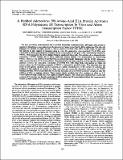| dc.contributor.author | HARTER, MARIAN L. | |
| dc.contributor.author | WANG, DUEN-MEI | |
| dc.contributor.author | SOONG, CHU-JING | |
| dc.contributor.author | DATTA, SHOUMEN | |
| dc.date.accessioned | 2008-09-23T14:01:47Z | |
| dc.date.available | 2008-09-23T14:01:47Z | |
| dc.date.issued | 1991-10 | |
| dc.identifier.uri | http://hdl.handle.net/1721.1/42835 | |
| dc.description | RESEARCH PAPER | en |
| dc.description.abstract | We have previously demonstrated that a purified bacterially synthesized ElA 289-amino-acid protein is
capable of stimulating transcription from the promoters of genes transcribed by RNA polymerase II in vitro (R.
Spangler, M. Bruner, B. Dalie, and M. L. Harter, Science 237:1044-1046, 1987). In this study, we show that
this protein is also capable of transactivating in vitro the adenovirus virus-associated (VA1) RNA gene
transcribed by RNA polymerase UI. Pertinent to the transcription of this gene is the rate-limiting component,
TFIIIC, which appears to be of two distinct forms in uninfected HeLa cells. The addition of an oligonucleotide
containing a TFIIIC binding site to HeLa whole-cell extracts inhibits VAT transcription by sequestering
TFIIIC. However, the addition of purified ETA to extracts previously challenged with the TFIIIC oligonucleotide
restores the level of VAT transcription. When included in the same reaction, an ElA-specific monoclonal
antibody reverses the restoration. Incubation of purified ETA with either HeLa cell nuclear or whole-cell
extracts alters the DNA-binding properties of TFIIIC as detected by gel shift assays. This alteration does not
occur if ElA-specific antibody and ETA protein are added simultaneously to the extract. In contrast, the
addition of this antibody to extracts at a later time does not reverse the alteration observed in the TFIIIC
binding activities. Never at any time did we note the formation of novel TFIIIC-promoter complexes after the
addition of ETA to nuclear extracts. These results clearly establish that ETA mediates its effect on VAT
transcription through TFIIIC in a very rapid yet indirect manner. The results also establish that a bacterially
produced ETA protein can directly participate in RNA polymerase II transcription without the requirement of
celiular protein synthesis or other viral proteins. | en |
| dc.description.sponsorship | RUTGERS UNIVERSITY SCHOOL OF MEDICINE (UMDNJ) and THE CLEVELAND CLINIC FOUNDATION (CCF) | en |
| dc.language.iso | en | en |
| dc.publisher | American Society for Microbiology | en |
| dc.subject | Transcription, E1A, Adenovirus, in vitro assay, RNA polymerase, transcription factor, TFIIIC | en |
| dc.title | A Purified Adenovirus 289-Amino-Acid ElA Protein Activates RNA Polymerase III Transcription In Vitro and Alters Transcription Factor TFIIIC | en |
| dc.type | Article | en |
